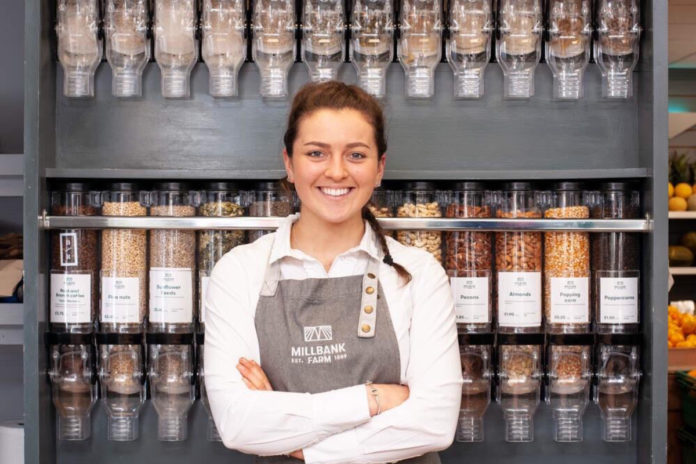Sixth-generation farmer, Emily McGowan, studies agri-food business with marketing at Harper Adams University while running a 500-strong sheep farm and her own farm shop in Killinchy, Co. Down.
The 22-year-old is the first female to carry on the long-standing tradition on Millbank Farm which was established in 1889.
“I’m the youngest of three girls and the only one interested in the land, so it was always my aspiration to return home to the farm,” she explained to That’s Farming.
Millbank Farm
Emily and her father, Adrian, run this 400-acre enterprise which he took the reins of when he was twenty-one.
Adrian has taken the business through its paces from farming 500 sheep, moving to suppling vegetables to supermarkets across Ireland (Lidl, Sainsburys) and growing broilers for Waitrose in England.
They farm 200 commercial breeding ewes, mainly Scottish blackface-cross-Blue Leicesters and also have a variety of rams including Texel, New Zealand Suffolk, and Suffolk.
Their most recent additions are Maggie and Lizzie, Highland cows.
“Working alongside my father is my biggest joy. Dad is very encouraging and allows me to develop the business in the directions I feel will succeed.”
“Seeing the farm continually develop is just so exhilarating,” said Emily, who will graduate later this year.
Managing Millbank Farm Shop
Millbank Farm Shop, which was established in June 2019 and is located just seven miles from their farm, is their most recent venture.
The farm grows 40 varieties of vegetables for the shop from carrots to kale and swedes to squashes.
Emily continues to farm and manage Millbank Farm Shop, a business which was established in the summer before she returned to university for her final year.
“I went to Mudwalls Fresh Produce in the Cotswolds for my placement year. This gave me a first-hand insight into the fresh produce industry and provided me with the confidence and knowledge to open my business.”
“I managed the business remotely from university and Dad continued to supply the shop with fresh produce. I couldn’t have done it without my father and my staff in the shop,” she admitted.
Women in agriculture
Emily believes with her strong personality she is treated the same as her male counterparts in the agricultural sector.
However, when setting her business, she encountered many people who were shocked and sceptical. “In the fresh produce market, I’m the only girl, this was very daunting at the start.”
“I feel the industry, especially in Northern Ireland, needs to support and encourage the younger farming generation to join this industry. It is not a glamorous industry, but it is rewarding.”
She believes that young people should do what they enjoy and not to ride with the conventional curve.
“I don’t agree with young people carrying on the farming tradition if they aren’t fully invested with the business model of the farm.”
“Whether this means going into a different industry or changing the business model of the farm, go for it!” she advised.
“Do what you love and that will positively reflect onto your business. You can’t be afraid of hard work either”, Emily added.
Future
Emily aspires to expand Millbank Farm Shop into a more successful business delivering fresh produce to their consumers.
“Another area that dad and I have enjoyed is getting face-to-face with the consumer. Hearing feedback good and bad is very rewarding and means you can move forward with your business development.”
Her main goal is to reverse the cycle of supermarkets selling fresh produce at a cheaper rate.
“I want to give consumers the opportunity to appreciate the real value of food and learn to love it again.”
“I feel the older generations, like my granny, Ruth, have a profound respect for food. The younger generation needs to gain this.”
Emily believes the future of farming is in the hands of Brexit. “If lower quality imports are opened up, then farms will have to become more intensive in order to compete.”
“Otherwise, farms will have to find a unique way of selling their produce direct to the customers.”
“I am a young agricultural businesswoman aspiring to provide a service that encourages its customers to regain respect for high quality, sustainably farmed produce,” Emily concluded.
Information
For further information, please see Millbank Farm’s website, Facebook, or Instagram.
Interview conducted by Catherina Cunnane
To share your story, email – [email protected]





